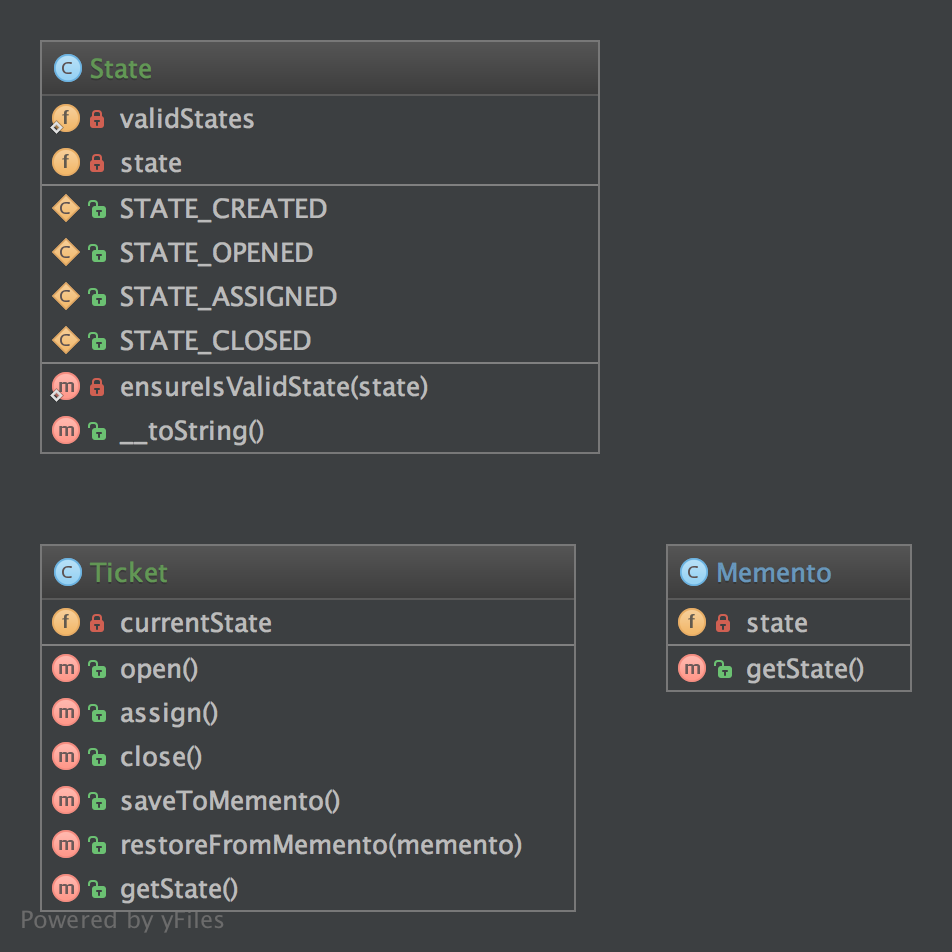3.6. Memento
3.6.1. Purpose
It provides the ability to restore an object to it’s previous state (undo via rollback) or to gain access to state of the object, without revealing it’s implementation (i.e., the object is not required to have a function to return the current state).
The memento pattern is implemented with three objects: the Originator, a Caretaker and a Memento.
Memento – an object that contains a concrete unique snapshot of state of any object or resource: string, number, array, an instance of class and so on. The uniqueness in this case does not imply the prohibition existence of similar states in different snapshots. That means the state can be extracted as the independent clone. Any object stored in the Memento should be a full copy of the original object rather than a reference to the original object. The Memento object is a «opaque object» (the object that no one can or should change).
Originator – it is an object that contains the actual state of an external object is strictly specified type. Originator is able to create a unique copy of this state and return it wrapped in a Memento. The Originator does not know the history of changes. You can set a concrete state to Originator from the outside, which will be considered as actual. The Originator must make sure that given state corresponds the allowed type of object. Originator may (but not should) have any methods, but they they can’t make changes to the saved object state.
Caretaker controls the states history. He may make changes to an object; take a decision to save the state of an external object in the Originator; ask from the Originator snapshot of the current state; or set the Originator state to equivalence with some snapshot from history.
3.6.2. Examples
The seed of a pseudorandom number generator
The state in a finite state machine
Control for intermediate states of ORM Model before saving
3.6.3. UML Diagram

3.6.4. Code
You can also find this code on GitHub
Memento.php
1<?php
2
3declare(strict_types=1);
4
5namespace DesignPatterns\Behavioral\Memento;
6
7class Memento
8{
9 public function __construct(private State $state)
10 {
11 }
12
13 public function getState(): State
14 {
15 return $this->state;
16 }
17}
State.php
1<?php
2
3declare(strict_types=1);
4
5namespace DesignPatterns\Behavioral\Memento;
6
7use InvalidArgumentException;
8
9class State implements \Stringable
10{
11 public const STATE_CREATED = 'created';
12 public const STATE_OPENED = 'opened';
13 public const STATE_ASSIGNED = 'assigned';
14 public const STATE_CLOSED = 'closed';
15
16 private string $state;
17
18 /**
19 * @var string[]
20 */
21 private static array $validStates = [
22 self::STATE_CREATED,
23 self::STATE_OPENED,
24 self::STATE_ASSIGNED,
25 self::STATE_CLOSED,
26 ];
27
28 public function __construct(string $state)
29 {
30 self::ensureIsValidState($state);
31
32 $this->state = $state;
33 }
34
35 private static function ensureIsValidState(string $state)
36 {
37 if (!in_array($state, self::$validStates)) {
38 throw new InvalidArgumentException('Invalid state given');
39 }
40 }
41
42 public function __toString(): string
43 {
44 return $this->state;
45 }
46}
Ticket.php
1<?php
2
3declare(strict_types=1);
4
5namespace DesignPatterns\Behavioral\Memento;
6
7/**
8 * Ticket is the "Originator" in this implementation
9 */
10class Ticket
11{
12 private State $currentState;
13
14 public function __construct()
15 {
16 $this->currentState = new State(State::STATE_CREATED);
17 }
18
19 public function open()
20 {
21 $this->currentState = new State(State::STATE_OPENED);
22 }
23
24 public function assign()
25 {
26 $this->currentState = new State(State::STATE_ASSIGNED);
27 }
28
29 public function close()
30 {
31 $this->currentState = new State(State::STATE_CLOSED);
32 }
33
34 public function saveToMemento(): Memento
35 {
36 return new Memento(clone $this->currentState);
37 }
38
39 public function restoreFromMemento(Memento $memento)
40 {
41 $this->currentState = $memento->getState();
42 }
43
44 public function getState(): State
45 {
46 return $this->currentState;
47 }
48}
3.6.5. Test
Tests/MementoTest.php
1<?php
2
3declare(strict_types=1);
4
5namespace DesignPatterns\Behavioral\Memento\Tests;
6
7use DesignPatterns\Behavioral\Memento\State;
8use DesignPatterns\Behavioral\Memento\Ticket;
9use PHPUnit\Framework\TestCase;
10
11class MementoTest extends TestCase
12{
13 public function testOpenTicketAssignAndSetBackToOpen()
14 {
15 $ticket = new Ticket();
16
17 // open the ticket
18 $ticket->open();
19 $openedState = $ticket->getState();
20 $this->assertSame(State::STATE_OPENED, (string) $ticket->getState());
21
22 $memento = $ticket->saveToMemento();
23
24 // assign the ticket
25 $ticket->assign();
26 $this->assertSame(State::STATE_ASSIGNED, (string) $ticket->getState());
27
28 // now restore to the opened state, but verify that the state object has been cloned for the memento
29 $ticket->restoreFromMemento($memento);
30
31 $this->assertSame(State::STATE_OPENED, (string) $ticket->getState());
32 $this->assertNotSame($openedState, $ticket->getState());
33 }
34}